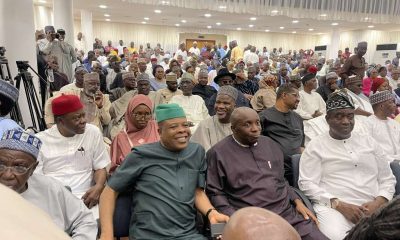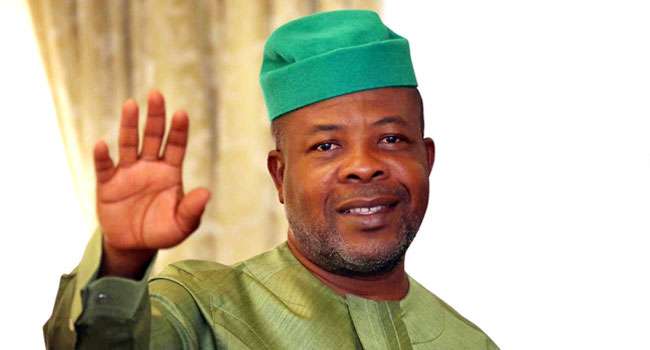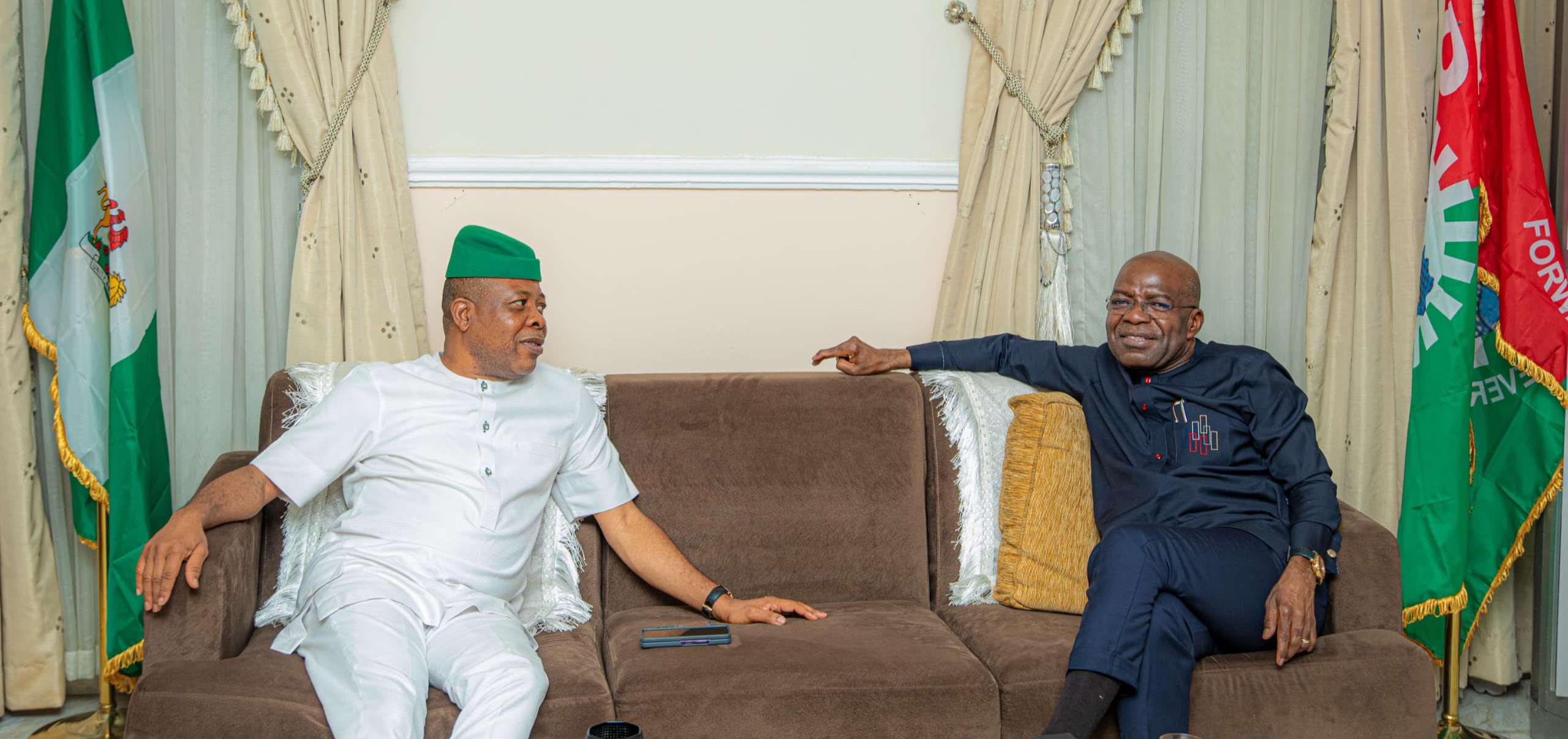Cover Story
Imo: The Inside story Intrigues behind Ihedioha’s downfall

By OBINNA EZUGWU
It was Thursday afternoon in Orlu town, Imo State, and the initial shock which greeted the Supreme Court pronouncement sacking Hon. Emeka Ihedioha from office as governor and declaring Senator Hope Uzodinma candidate of the All Progressive Congress (APC) governor-elect two days earlier on Tuesday had dissipated. Everyone had busied himself with whatever he did to put food on the table.
Inner streets are largely in bad shape. Outer roads had been haphazardly done. Although relatively new in age, they are already riddled with port holes, one of the legacies of Senator Rochas Okorocha, the immediate past governor, in the area.
From interactions one could sense a general view that an injustice had been done to Ihedioha, the first Mbaise son to occupy the Douglas House, Owerri and Indeed the first from Owerri zone to do so since the return of democracy almost 21 years ago in 1999.
But beneath that pervasive atmosphere, one also could feel a sense of contentment. Ihedioha’s ouster meant that another Orlu son in Uzodinma had become governor, the third to do so since 1999. One young man had quipped, “after all, Orlu is born to rule in Imo.” Unfortunately, there is not much in terms of infrastructure to show for it.
Of the nearly 21 years between 1999 and 2020, Orlu has had 16 years as governor. Achike Udenwa and Rochas Okorocha, both from Orlu senatorial zone, did eight years each, while Ikedi Ohakim from Okigwe Zone did four years, and Ihedioha from Owerri zone, seven months.
There is a sense therefore, in which the Orlu zone, with 12 of the 27 local governments in the state are seen as the internal colonisers of the state, a feeling that has been further amplified by the emergence of Uzodinma as new governor.
In some sense, Ihedioha had been an outsider to power. A man from Mbaise, in the Oweri zone, a people battling all manner of stereotypes, prominent of which is that they favour mostly their own people. The major apprehension many had about Ihedioha was that he may not carry others along. He would only, it was said, favour mostly, if not only his Mbaise brothers.
This stereotype in part has continued to polarise even the Owerri zone with Owerri and Mbaise, the two main groups in the zone, not always keen to work together, to evidently, their own peril. The zone has been the trailing leg of the state’s politics, and indeed is yet to produce a leader of national reckoning.
Chief Martin Agbaso was almost governor, he had all it took, and indeed had ‘won’ the governorship seat, but was denied by the sudden suspension of collation by the INEC led Prof. Maurice Iwu. He was later very instrumental to the emergence of Okorocha in 2011, with his brother, Jude Agbaso becoming deputy governor.
The next from the zone to rise to prominence is Ihedioha. His reign is now short-lived. In informal circles, some suggest it might even be a curse.
But in addition to all else Ihedioha had to battle stereotypes, which like all stereotypes, lack any basis on reason.
“People here say that Ihedioha has not done anything visible in the last 9 months, Opara, a resident of Owerri noted. He placed a lot of Mbaise people in government.”
There was, indeed, a sort of gang up against him, even among the stalwarts of his party, the People’s Democratic Party (PDP) in the state. His crime, they say is not carrying people along.
“I can tell you many PDP chieftains joined the APC to plot against him,” a prominent PDP figure in the state who craved anonymity noted. “It was us that supplied the APC most of the evidence they used against him.
“He abandoned us as soon as he became governor. He even favoured some APC members more than those of us in the PDP who worked for him.”
The PDP had broken into factions. The faction opposed to the former governor had worked actively with the APC during the legal tussle that eventually consumed him. Not carrying along is the word, which of course, often means not extending the spoils of office to as many people. It was one of the grievances against him.
The Imo governorship poll had been characterised by many intrigues. Marred by massive rigging, it was the survival of the fittest. Each person basically produced huge figures from his own constituency. Ihedioha had won with massive Mbaise votes to maintain unassailable lead and eventually arrive at 273,404.
Okorocha’s son in-law too, Uche Nwosu who ran under the Action Alliance (AA) platform produced huge numbers from his part Orlu to come second at 190, 364 votes. Ifeanyi Ararume of the All Progressive Grand Alliance (APGA) from Okigwe, had 114, 676 to come third. Uzodinma’s own figures had been outrageously, if not obscenely huge; a hardly explainable 309,753 votes from 388 polling units, submitted, not by any independent National Election Commission (INEC) official it was said, but by the police. This was rejected outright by the electoral body, which meant that Uzodinma came fourth with 98,458 votes.
What the Supreme Court did to award him victory therefore, was perhaps to accept the rejected unexplainable 309,753 votes from the 388 polling units. The addition of which has ridiculously, ballooned the total number of votes cast in the election to over 948,000 votes, which is more than the total number of 823,743 accredited voters for the election, and of course, way above the 739,585 votes cast, and of course, the 714,362 valid votes, 25,230 having been cancelled.
During the polls, Ihedioha had had the advantage of goodwill across the state. Many were fed up with Okorocha as governor and indeed the APC. APGA which was perhaps even more popular than the PDP, had lost the support of its key stakeholders and as a consequence, popular support on account of its badly managed primary election that produced Ararume, who had only just defected to the party, as candidate.
Ihedioha won, being easily the most popular candidate and by then in the most popular party across the state, a victory that was for many, a welcome relief from the days of Okorocha and the APC. Indeed, many in the APC were said to have worked for him. They, he supposedly favoured more than those in the PDP.
But as it has turned out, his reign is not to be long. Ihedioha had taken on his predecessor, Okorocha who had allegedly looted the state’s treasury whilst he was governor. It helped, perhaps to only keep the state’s political atmosphere charged and provided the impetus for his ouster.
Conspiracies are rife as to what really led to the outcome of the Supreme Court case. Some say APC is seeking to establish a foothold in the Southeast in the interest of 2023 presidency, or even in the general interest of the north. Southeast had been the only zone without an APC government following the end of Okorocha’s tenure.
A source close to power play in the north had indeed argued that Uzodinma had been chosen as the governor of Imo, and that it must happen. Perhaps nothing better explains the inexplicable judgment of the apex court than this. In the final analysis, Uzodinma is governor, APC now has a presence, once again, in the Southeast.
There are, for many, question marks about his character. But in the same token, some say he is a generous man who has empowered many. In any case, his emergence appears to have united the political heavyweights in the state. When he went to obtain his certificate of return from INEC, he was accompanied by Ararume, Nwosu among others and a host of others.
Okorocha was first to congratulate him on his victory at the Supreme Court, promising to work with him. But it appears that Uzodinma is not buying it. Immediately he was sworn in as governor, he asked that past governments from 2010 be probed.
The intrigues may have just started. But apparently backed by certain interest for its larger political interest, Uzodinma may be confident he will survive. With issues around him, he ought to be a good boy. And in any case, for some stakeholders, what should matter now is for all to come together to build Imo.
“I have not been privileged to peruse the judgment of the Supreme Court to determine for myself, the strength and the weakness of the judgment. But, however strong or weak it is still the judgment of the Supreme Court, which remains its judgment and can only be set aside by it. And therefore, of course, has to be enforced,” said APGA chieftain, Barr. Okey Okoroji.
“As an Imo man, I don’t think we should dissipate energy at this. We shouldn’t be bickering over it. Of course, we as a people are interested in justice and fairness. If it appears an injustice has been done to any party as a result of that judgment, the court is still open to the aggrieved party. And there is still leeway through which such an aggrieved party can express himself, in form of an application to that court to overrule itself. But there has to be very solid grounds.
“But in the meantime, governance should not be put in abeyance in the state. This is about the life of a people who have suffered so much over the last 20 years. We have hardly gotten it right in Imo in terms of quality leadership. But this is what we have at the moment. And it’s not the worst ever.
“Hope Uzodinma, beyond what people say about him, not necessarily based on any evidence of any fact, but based on imaginations, is a man who knows the streets, and he knows the palaces. He is an all rounder. He has evolved for a long time.
“People shouldn’t just become antagonistic to his government. He should be given support; it’s about the welfare of the people. He should be given all the support he needs to take the state forward.”
Within the week not less than nine PDP and AA lawmakers in the state defected to the APC, suggesting perhaps that possible fear of impeachment may no longer arise. Many more are expected to defect. PDP has continued to protest the judgment, but it would appear increasingly, that the opposition party is fighting a lost battle.









